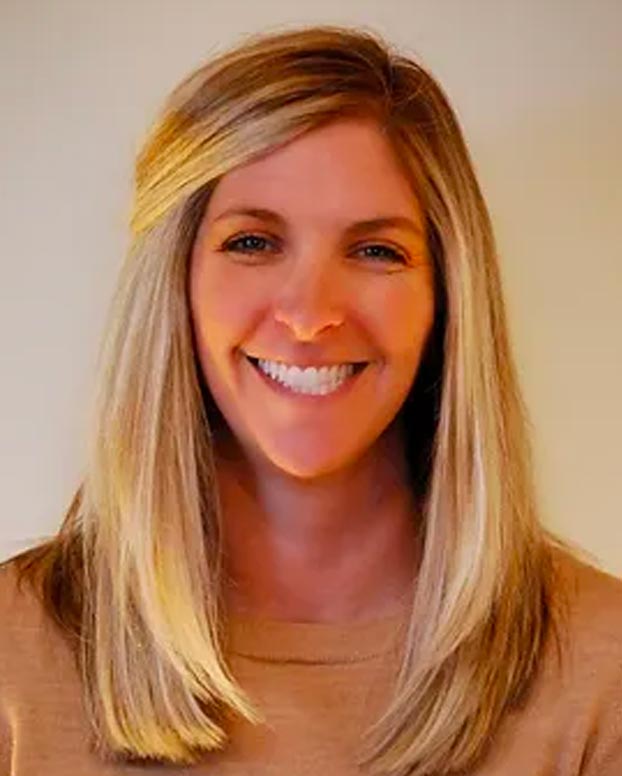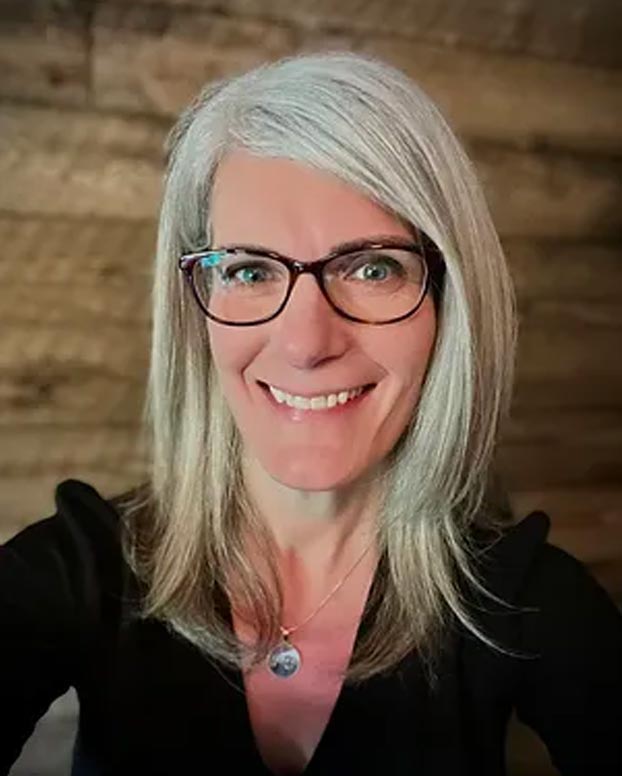Denver Early Steps: Supporting Denver’s Youngest Community Members
March 19, 2024
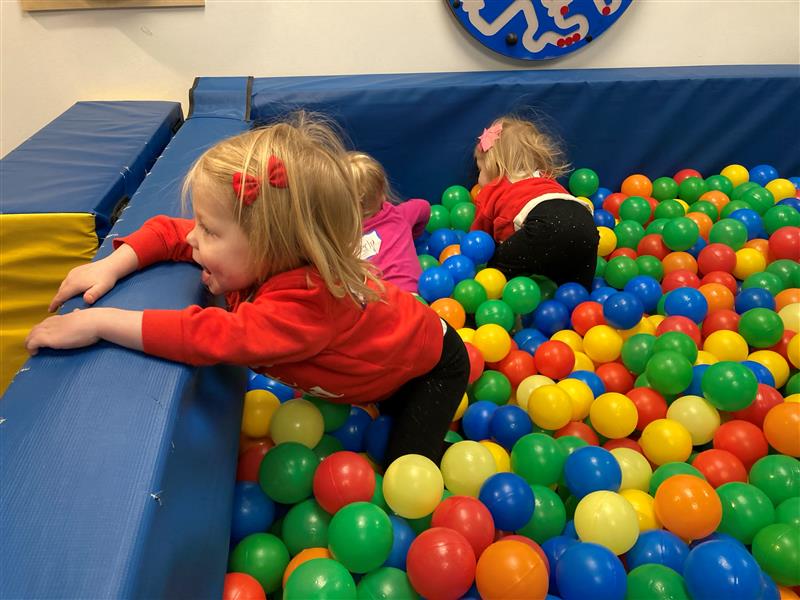
Denver Early Steps (DES) provides many different resources, services, and supports to families with infants and toddlers experiencing developmental delays.
At a recent Family Social, toddlers excitedly explored a ball pit, joyfully army crawled through a bright blue tunnel, and brushed their hands across rows of neon lights displayed on a wall panel. Drop-in family socials are just one example of programming that Denver Early Steps (DES), a RMHS program designed to support infants and toddlers in meeting developmental milestones, offers.
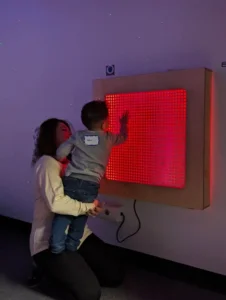
A young boy plays at a recent Family Social at the Sensory Club.
This article highlights the work of DES including what supports it offers, who it serves, and how to stay in the know on upcoming news, classes, and group therapies. There is also a downloadable resource of inclusive activities to do with your little ones linked at the end of the article.
A “no wrong door” gap support solution for infants and toddlers.
DES Program Manager, Haley Carle, describes the DES program, which she helped to create after state-level pandemic-fueled budget cuts to Early Intervention services as, “A no wrong door gap support services for infants and toddlers.”
Carle elaborated by sharing how her team operates under the guiding principle that any child with a developmental delay in any area of development can benefit from the supports that DES offers. The four areas of growth and development that DES evaluates and supports are:
- Physical development (which refers to strength and physical skills)
- Cognitive development (which involves thinking and problem-solving)
- Language development (which refers to communication and understanding)
- Social-emotional development (which affects how children interact with others and process feelings)
Whereas Early Intervention (EI) has strict eligibility requirements, DES was established with the goal of ensuring children with any developmental delay continue to receive supports.
DES also offers classes that family members or caregivers with concerns about their child’s development can attend. DES even has plans to support children at greater risk of developing a future delay due to toxic stress in their lives soon, once staff complete Adverse Childhood Experience training.
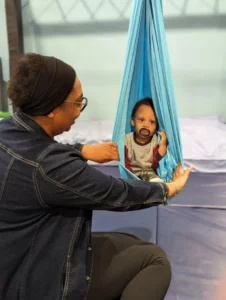
A family enjoys a recent Family Social at the Sensory Club.
Like all the staff working within the DES program, Carle is passionate about her work and feels joy in knowing how much her program benefits Denver City and County infants and toddlers.
Putting families first and fostering inclusivity.
At the heart of DES lies a philosophy deeply rooted in community collaboration and family empowerment. Through initiatives like developmental screenings and developmental monitoring, DES connects with families who may have concerns about their child’s development, offering support and guidance in navigating their child’s developmental journey.
DES Service Coordinator, Kimberlie Dusseldorp, shared how DES staff strive to ensure families feel comfortable asking for and receiving support. “We want families to understand that our programs are completely family-driven, and we are available in whatever capacity they need for as little or as long as they need. We want families to know it’s okay to ask questions and not know what’s typical in child development. It’s okay to want and need some support in how to support your child’s development.”
DES uses the Ages and Stages Questionnaire—a parent report that allows parents to report on what they’re seeing in their child’s development to identify possible delays. Committed to reaching as many Denver families as possible and meeting them in their own communities where they feel most comfortable, DES staff also do robust community outreach by visiting daycares, community events, and community centers to offer screenings that utilize the Ages and Stages Questionnaire.
While at outreach events, DES staff give families the choice to complete the questionnaire right then and there, offering guidance as needed, or to schedule a more convenient time to conduct the screening.
Depending on the results of the questionnaire, DES staff either make a referral for families to Early Intervention services through the state, connect them to DES supports, or discuss other supports available if not deemed eligible for either program.
Children who qualify for DES services are connected to a dedicated service coordinator and various therapies. DES staff ensure the path forward is family-driven and they work hard to cater supports to the family needs and goals. Children who don’t qualify for the DES program have the option to enroll in the developmental monitoring program, which ensures a service coordinator addresses family concerns about their child’s development through occasional check-ins.
To boost engagement and ensure that support is offered as broadly as possible, DES puts a priority focus on meeting the needs of Spanish speakers. Half of the staff in DES are Spanish speaking, all screening materials are available in both English and Spanish, and personal guidance can be provided in Spanish, which serves an important and growing need in Denver. Additionally, the DES team has hosted three screening events entirely in Spanish and plan to do more in the future.
“Our whole goal,” Carle shares, “is to find out what these families need and remove all barriers to ensure that all families have access to the supports that they need.”
“We see the family as a team member,” Dusseldorp shares. “We really encourage family participation and want to hear their questions, feedback, and voice.”
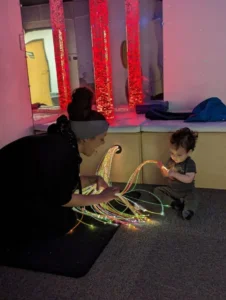
A child plays with glow-in-the-dark materials at a recent Family Social.
What supports does DES offer?
DES offers traditional case management and direct service supports. The program offers a variety of group therapies, some of which are led by therapists and others by service coordinators, which brings empowerment and connection between families with children with developmental delays.
The types of group therapies derive from both staff-identified needs as well as close monitoring of what community members are voicing.
“It’s really cool that we are able to take the things that parents and the community are voicing that they want and turn it into these larger groups. It takes time but it’s really community-led,” Carle shared.
Examples of services offered by DES include:
Family Socials: These monthly gatherings are designed as a drop-in space for parents and caregivers to share their experiences, brainstorm ideas, and build a support network with other families. Each month highlights a different topic such as sensory regulation, transitioning into preschool, or picky eating. Typically held virtually, DES also offers in-person “field trips” for adults and children alike about four times a year.
Recurring Virtual Learning Opportunities:
- Intro to Signs in Daily Routines: An hour-long class designed to greater understand the benefits of and common misconceptions around using signs with children and how to cue your child to use signs.
- Building Blocks of Communication Development: A 90-minute class designed to support communication development at all levels and address concerns about child’s language expression.
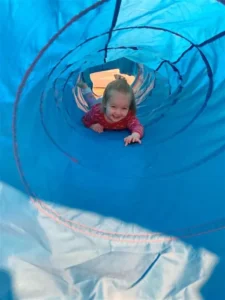
A child plays at a recent Family Social.
Looking ahead:
As DES continues to evolve, the focus remains staying true to their mission: serving the needs of Denver children with developmental delays with both compassion and dedication and ensuring that families feel supported.
DES staff are currently undergoing training to implement ACEs screenings, or Adverse Childhood Experiences screenings, which would expand services to children at risk of experiencing childhood stress and trauma. They hope to offer these screenings in the community soon.
“Our goal is to identify those children and families at-risk of toxic stress and intervene before we see the effects,” Carle explained.
DES is also excited to launch Sibshops this summer, which is part of a national program called The Sibling Support Project. The goal of Sibshops is to provide the siblings of children with disabilities the chance to connect over their shared experiences and have some fun while learning more about their sibling with disabilities.
How can you stay tuned in?
In the ever-changing landscape of early childhood services, DES proudly offers a variety of supports for families in Denver. With a commitment to community, compassion, and collaboration, DES is not just bridging gaps; it’s building futures, one step at a time.
As Carle aptly put it, “We get to do such fun stuff!”
And indeed, the work of Denver Early Steps is not just important; it’s essential, shaping the lives of our youngest community members and their families for years to come.
To stay in the loop about future DES offerings, news, and inclusive family-friendly activities, subscribe to the monthly DES newsletter by clicking here.
To view a list of five inclusive family activities well-suited for little ones, check out the image below.







